Learning Journal and Summary of Journal
VerifiedAdded on 2022/11/18
|9
|2661
|151
AI Summary
This personal journal discusses the discourse of counselling, its definition and meaning, the types and other various aspects regarding counselling as a discourse. It also covers the characteristics of a counsellor, imperative skills that one counselor must have, and the counselling theories.
Contribute Materials
Your contribution can guide someone’s learning journey. Share your
documents today.
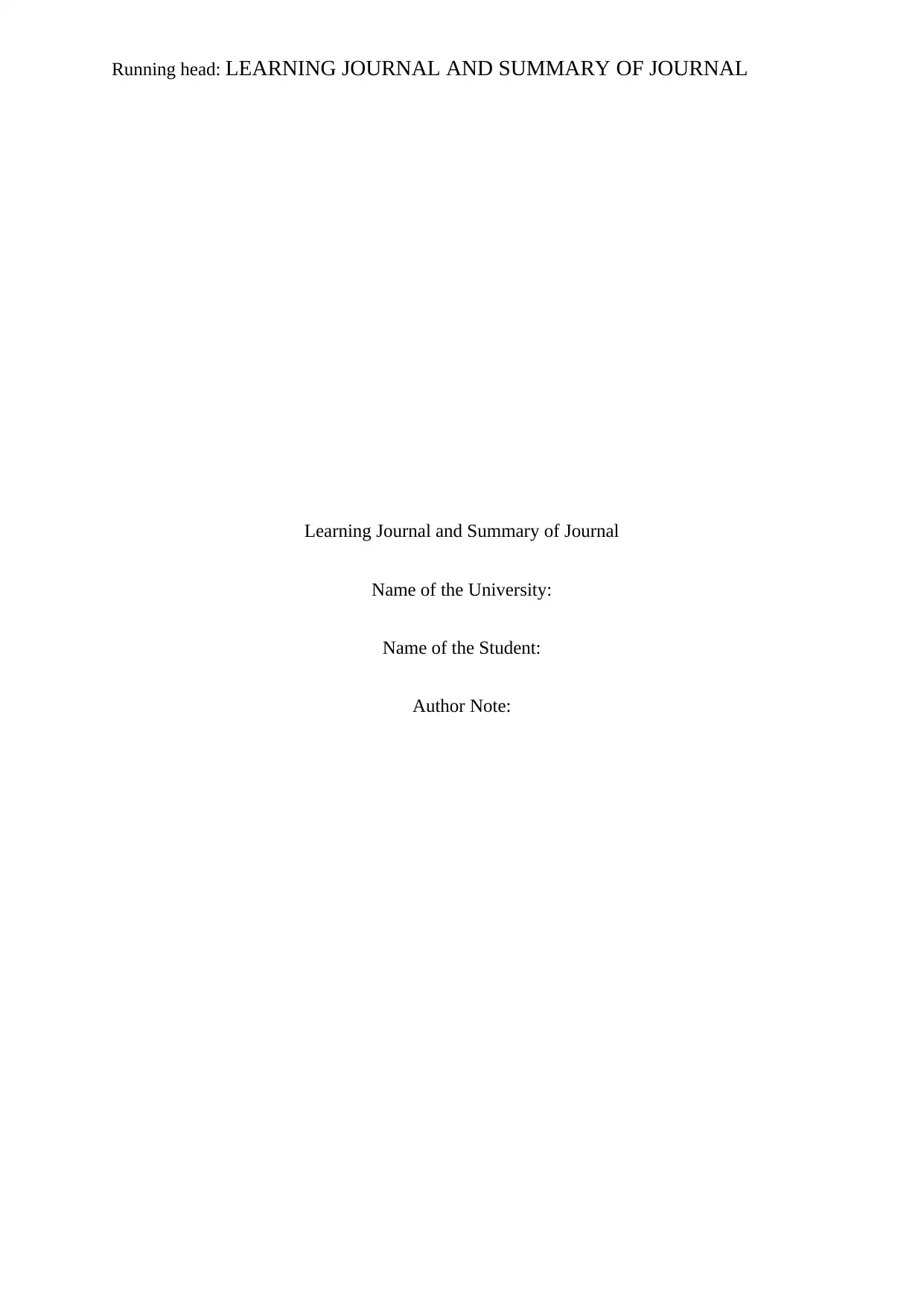
Running head: LEARNING JOURNAL AND SUMMARY OF JOURNAL
Learning Journal and Summary of Journal
Name of the University:
Name of the Student:
Author Note:
Learning Journal and Summary of Journal
Name of the University:
Name of the Student:
Author Note:
Secure Best Marks with AI Grader
Need help grading? Try our AI Grader for instant feedback on your assignments.
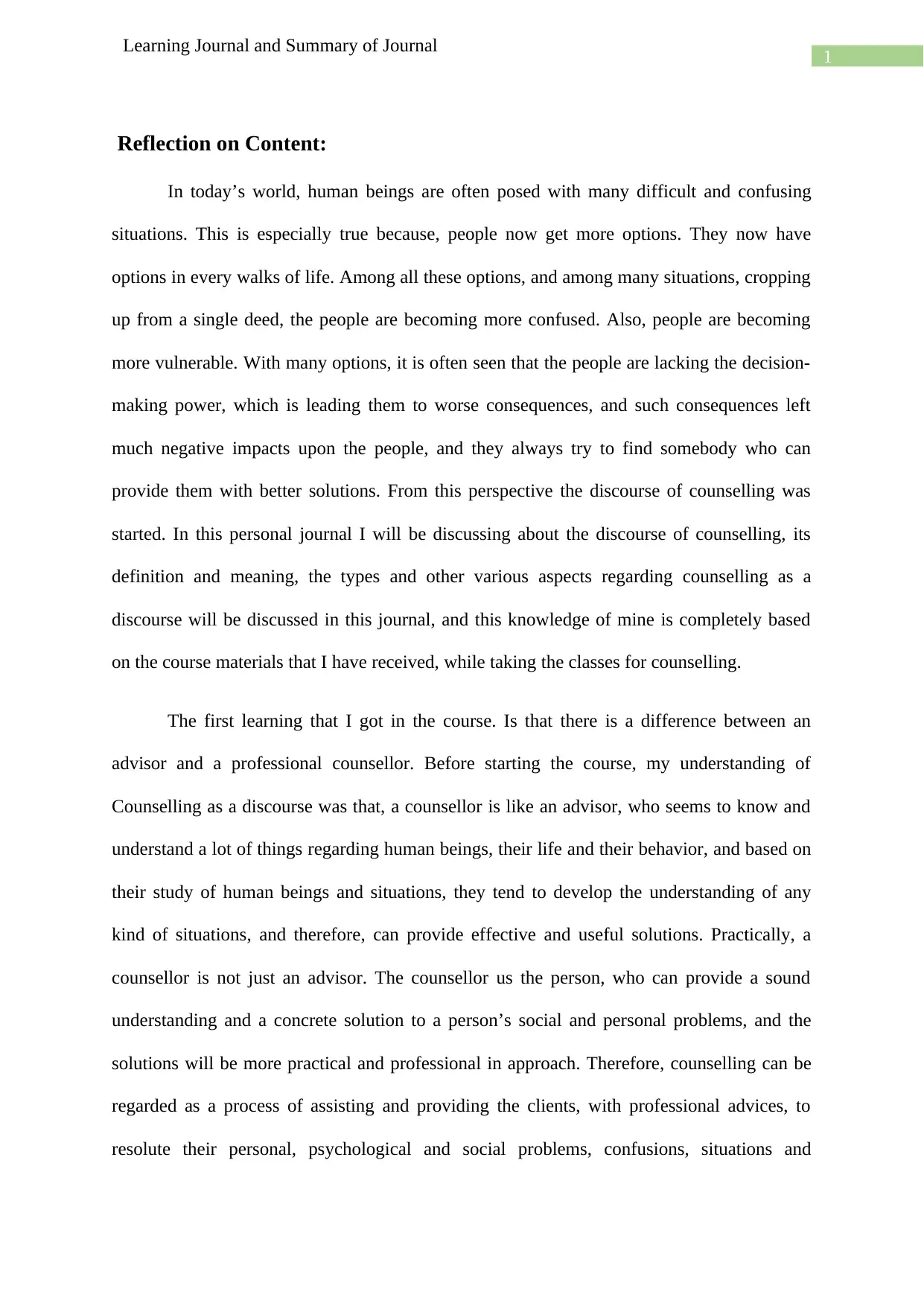
1
Learning Journal and Summary of Journal
Reflection on Content:
In today’s world, human beings are often posed with many difficult and confusing
situations. This is especially true because, people now get more options. They now have
options in every walks of life. Among all these options, and among many situations, cropping
up from a single deed, the people are becoming more confused. Also, people are becoming
more vulnerable. With many options, it is often seen that the people are lacking the decision-
making power, which is leading them to worse consequences, and such consequences left
much negative impacts upon the people, and they always try to find somebody who can
provide them with better solutions. From this perspective the discourse of counselling was
started. In this personal journal I will be discussing about the discourse of counselling, its
definition and meaning, the types and other various aspects regarding counselling as a
discourse will be discussed in this journal, and this knowledge of mine is completely based
on the course materials that I have received, while taking the classes for counselling.
The first learning that I got in the course. Is that there is a difference between an
advisor and a professional counsellor. Before starting the course, my understanding of
Counselling as a discourse was that, a counsellor is like an advisor, who seems to know and
understand a lot of things regarding human beings, their life and their behavior, and based on
their study of human beings and situations, they tend to develop the understanding of any
kind of situations, and therefore, can provide effective and useful solutions. Practically, a
counsellor is not just an advisor. The counsellor us the person, who can provide a sound
understanding and a concrete solution to a person’s social and personal problems, and the
solutions will be more practical and professional in approach. Therefore, counselling can be
regarded as a process of assisting and providing the clients, with professional advices, to
resolute their personal, psychological and social problems, confusions, situations and
Learning Journal and Summary of Journal
Reflection on Content:
In today’s world, human beings are often posed with many difficult and confusing
situations. This is especially true because, people now get more options. They now have
options in every walks of life. Among all these options, and among many situations, cropping
up from a single deed, the people are becoming more confused. Also, people are becoming
more vulnerable. With many options, it is often seen that the people are lacking the decision-
making power, which is leading them to worse consequences, and such consequences left
much negative impacts upon the people, and they always try to find somebody who can
provide them with better solutions. From this perspective the discourse of counselling was
started. In this personal journal I will be discussing about the discourse of counselling, its
definition and meaning, the types and other various aspects regarding counselling as a
discourse will be discussed in this journal, and this knowledge of mine is completely based
on the course materials that I have received, while taking the classes for counselling.
The first learning that I got in the course. Is that there is a difference between an
advisor and a professional counsellor. Before starting the course, my understanding of
Counselling as a discourse was that, a counsellor is like an advisor, who seems to know and
understand a lot of things regarding human beings, their life and their behavior, and based on
their study of human beings and situations, they tend to develop the understanding of any
kind of situations, and therefore, can provide effective and useful solutions. Practically, a
counsellor is not just an advisor. The counsellor us the person, who can provide a sound
understanding and a concrete solution to a person’s social and personal problems, and the
solutions will be more practical and professional in approach. Therefore, counselling can be
regarded as a process of assisting and providing the clients, with professional advices, to
resolute their personal, psychological and social problems, confusions, situations and
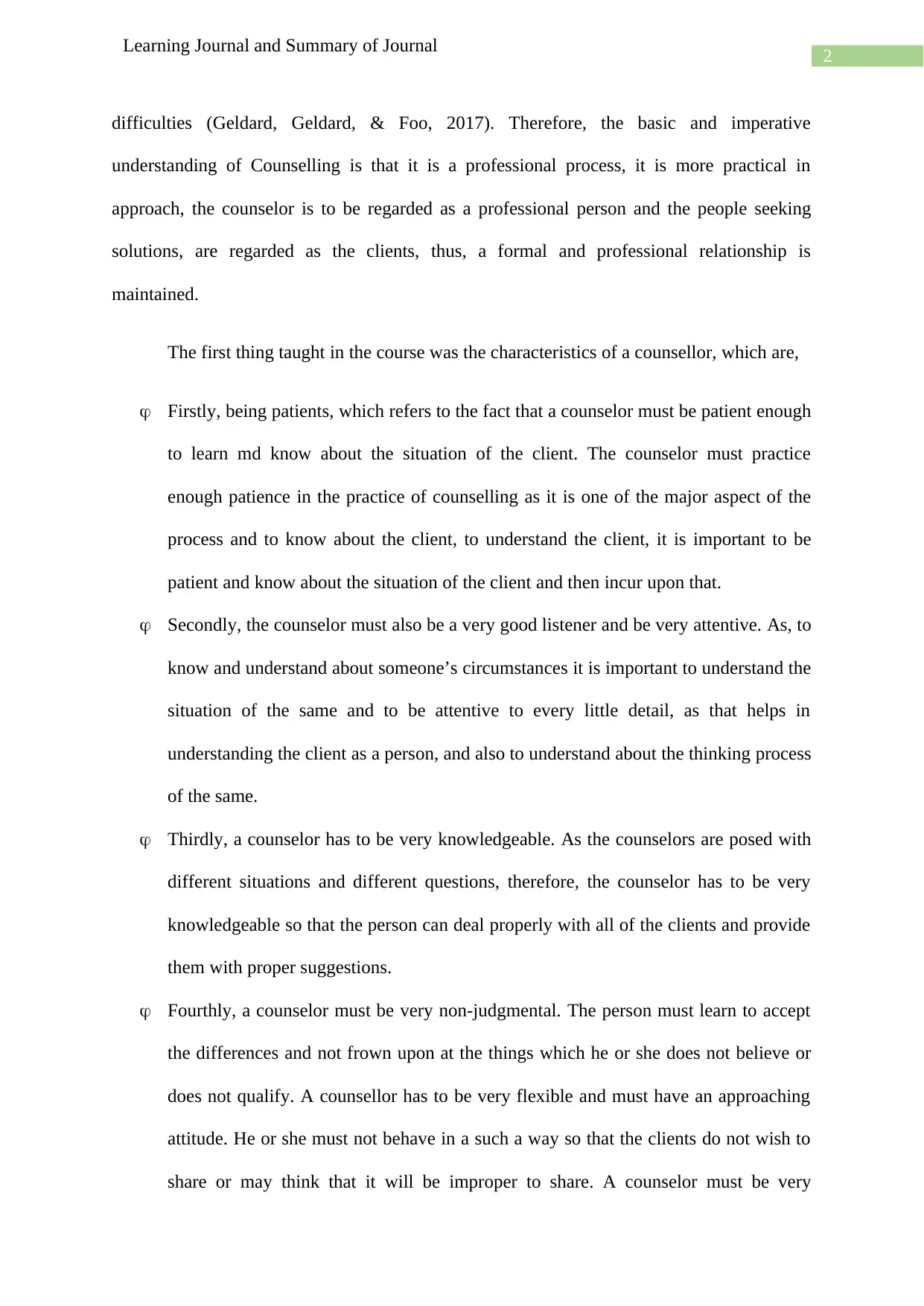
2
Learning Journal and Summary of Journal
difficulties (Geldard, Geldard, & Foo, 2017). Therefore, the basic and imperative
understanding of Counselling is that it is a professional process, it is more practical in
approach, the counselor is to be regarded as a professional person and the people seeking
solutions, are regarded as the clients, thus, a formal and professional relationship is
maintained.
The first thing taught in the course was the characteristics of a counsellor, which are,
Firstly, being patients, which refers to the fact that a counselor must be patient enough
to learn md know about the situation of the client. The counselor must practice
enough patience in the practice of counselling as it is one of the major aspect of the
process and to know about the client, to understand the client, it is important to be
patient and know about the situation of the client and then incur upon that.
Secondly, the counselor must also be a very good listener and be very attentive. As, to
know and understand about someone’s circumstances it is important to understand the
situation of the same and to be attentive to every little detail, as that helps in
understanding the client as a person, and also to understand about the thinking process
of the same.
Thirdly, a counselor has to be very knowledgeable. As the counselors are posed with
different situations and different questions, therefore, the counselor has to be very
knowledgeable so that the person can deal properly with all of the clients and provide
them with proper suggestions.
Fourthly, a counselor must be very non-judgmental. The person must learn to accept
the differences and not frown upon at the things which he or she does not believe or
does not qualify. A counsellor has to be very flexible and must have an approaching
attitude. He or she must not behave in a such a way so that the clients do not wish to
share or may think that it will be improper to share. A counselor must be very
Learning Journal and Summary of Journal
difficulties (Geldard, Geldard, & Foo, 2017). Therefore, the basic and imperative
understanding of Counselling is that it is a professional process, it is more practical in
approach, the counselor is to be regarded as a professional person and the people seeking
solutions, are regarded as the clients, thus, a formal and professional relationship is
maintained.
The first thing taught in the course was the characteristics of a counsellor, which are,
Firstly, being patients, which refers to the fact that a counselor must be patient enough
to learn md know about the situation of the client. The counselor must practice
enough patience in the practice of counselling as it is one of the major aspect of the
process and to know about the client, to understand the client, it is important to be
patient and know about the situation of the client and then incur upon that.
Secondly, the counselor must also be a very good listener and be very attentive. As, to
know and understand about someone’s circumstances it is important to understand the
situation of the same and to be attentive to every little detail, as that helps in
understanding the client as a person, and also to understand about the thinking process
of the same.
Thirdly, a counselor has to be very knowledgeable. As the counselors are posed with
different situations and different questions, therefore, the counselor has to be very
knowledgeable so that the person can deal properly with all of the clients and provide
them with proper suggestions.
Fourthly, a counselor must be very non-judgmental. The person must learn to accept
the differences and not frown upon at the things which he or she does not believe or
does not qualify. A counsellor has to be very flexible and must have an approaching
attitude. He or she must not behave in a such a way so that the clients do not wish to
share or may think that it will be improper to share. A counselor must be very
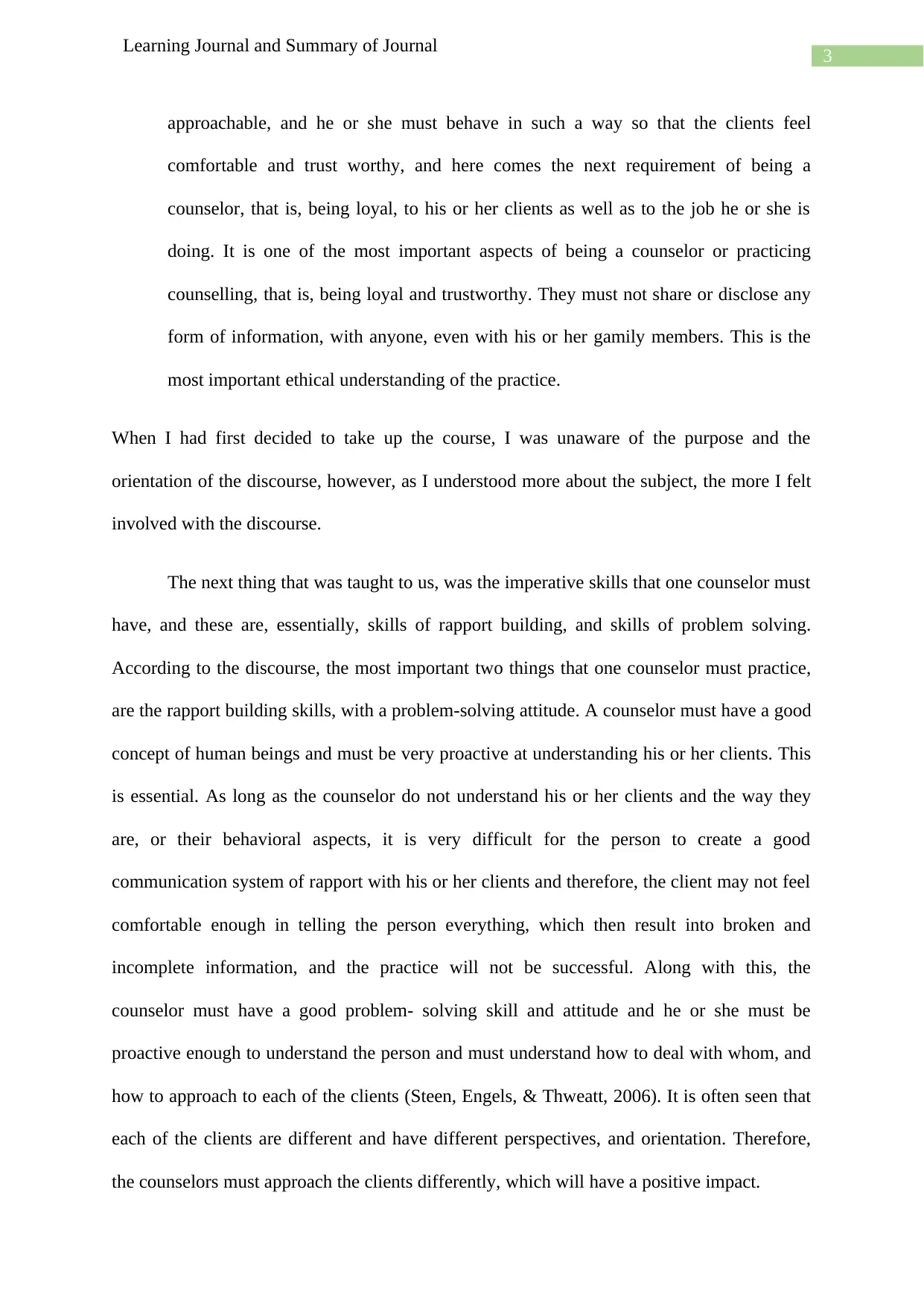
3
Learning Journal and Summary of Journal
approachable, and he or she must behave in such a way so that the clients feel
comfortable and trust worthy, and here comes the next requirement of being a
counselor, that is, being loyal, to his or her clients as well as to the job he or she is
doing. It is one of the most important aspects of being a counselor or practicing
counselling, that is, being loyal and trustworthy. They must not share or disclose any
form of information, with anyone, even with his or her gamily members. This is the
most important ethical understanding of the practice.
When I had first decided to take up the course, I was unaware of the purpose and the
orientation of the discourse, however, as I understood more about the subject, the more I felt
involved with the discourse.
The next thing that was taught to us, was the imperative skills that one counselor must
have, and these are, essentially, skills of rapport building, and skills of problem solving.
According to the discourse, the most important two things that one counselor must practice,
are the rapport building skills, with a problem-solving attitude. A counselor must have a good
concept of human beings and must be very proactive at understanding his or her clients. This
is essential. As long as the counselor do not understand his or her clients and the way they
are, or their behavioral aspects, it is very difficult for the person to create a good
communication system of rapport with his or her clients and therefore, the client may not feel
comfortable enough in telling the person everything, which then result into broken and
incomplete information, and the practice will not be successful. Along with this, the
counselor must have a good problem- solving skill and attitude and he or she must be
proactive enough to understand the person and must understand how to deal with whom, and
how to approach to each of the clients (Steen, Engels, & Thweatt, 2006). It is often seen that
each of the clients are different and have different perspectives, and orientation. Therefore,
the counselors must approach the clients differently, which will have a positive impact.
Learning Journal and Summary of Journal
approachable, and he or she must behave in such a way so that the clients feel
comfortable and trust worthy, and here comes the next requirement of being a
counselor, that is, being loyal, to his or her clients as well as to the job he or she is
doing. It is one of the most important aspects of being a counselor or practicing
counselling, that is, being loyal and trustworthy. They must not share or disclose any
form of information, with anyone, even with his or her gamily members. This is the
most important ethical understanding of the practice.
When I had first decided to take up the course, I was unaware of the purpose and the
orientation of the discourse, however, as I understood more about the subject, the more I felt
involved with the discourse.
The next thing that was taught to us, was the imperative skills that one counselor must
have, and these are, essentially, skills of rapport building, and skills of problem solving.
According to the discourse, the most important two things that one counselor must practice,
are the rapport building skills, with a problem-solving attitude. A counselor must have a good
concept of human beings and must be very proactive at understanding his or her clients. This
is essential. As long as the counselor do not understand his or her clients and the way they
are, or their behavioral aspects, it is very difficult for the person to create a good
communication system of rapport with his or her clients and therefore, the client may not feel
comfortable enough in telling the person everything, which then result into broken and
incomplete information, and the practice will not be successful. Along with this, the
counselor must have a good problem- solving skill and attitude and he or she must be
proactive enough to understand the person and must understand how to deal with whom, and
how to approach to each of the clients (Steen, Engels, & Thweatt, 2006). It is often seen that
each of the clients are different and have different perspectives, and orientation. Therefore,
the counselors must approach the clients differently, which will have a positive impact.
Secure Best Marks with AI Grader
Need help grading? Try our AI Grader for instant feedback on your assignments.
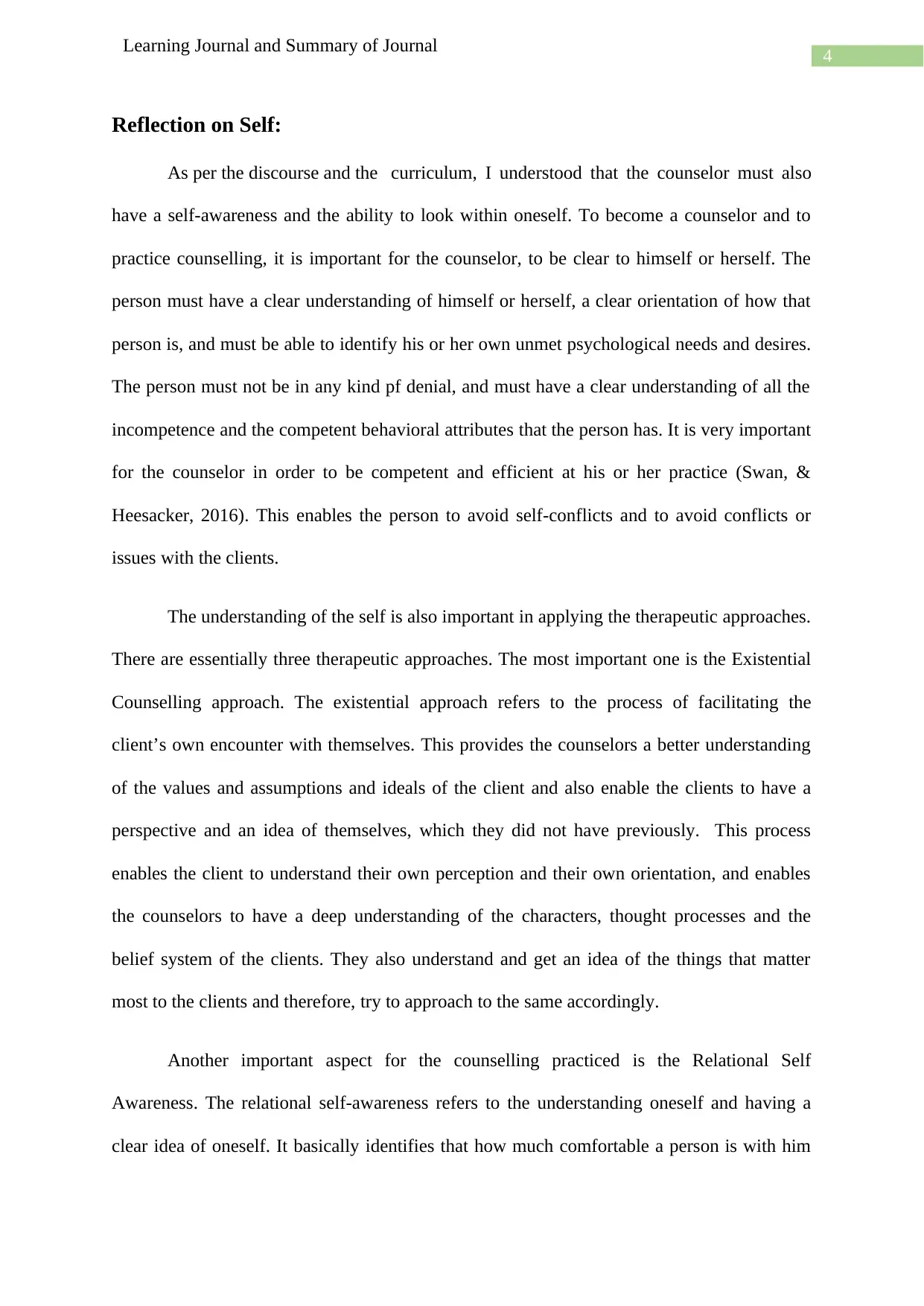
4
Learning Journal and Summary of Journal
Reflection on Self:
As per the discourse and the curriculum, I understood that the counselor must also
have a self-awareness and the ability to look within oneself. To become a counselor and to
practice counselling, it is important for the counselor, to be clear to himself or herself. The
person must have a clear understanding of himself or herself, a clear orientation of how that
person is, and must be able to identify his or her own unmet psychological needs and desires.
The person must not be in any kind pf denial, and must have a clear understanding of all the
incompetence and the competent behavioral attributes that the person has. It is very important
for the counselor in order to be competent and efficient at his or her practice (Swan, &
Heesacker, 2016). This enables the person to avoid self-conflicts and to avoid conflicts or
issues with the clients.
The understanding of the self is also important in applying the therapeutic approaches.
There are essentially three therapeutic approaches. The most important one is the Existential
Counselling approach. The existential approach refers to the process of facilitating the
client’s own encounter with themselves. This provides the counselors a better understanding
of the values and assumptions and ideals of the client and also enable the clients to have a
perspective and an idea of themselves, which they did not have previously. This process
enables the client to understand their own perception and their own orientation, and enables
the counselors to have a deep understanding of the characters, thought processes and the
belief system of the clients. They also understand and get an idea of the things that matter
most to the clients and therefore, try to approach to the same accordingly.
Another important aspect for the counselling practiced is the Relational Self
Awareness. The relational self-awareness refers to the understanding oneself and having a
clear idea of oneself. It basically identifies that how much comfortable a person is with him
Learning Journal and Summary of Journal
Reflection on Self:
As per the discourse and the curriculum, I understood that the counselor must also
have a self-awareness and the ability to look within oneself. To become a counselor and to
practice counselling, it is important for the counselor, to be clear to himself or herself. The
person must have a clear understanding of himself or herself, a clear orientation of how that
person is, and must be able to identify his or her own unmet psychological needs and desires.
The person must not be in any kind pf denial, and must have a clear understanding of all the
incompetence and the competent behavioral attributes that the person has. It is very important
for the counselor in order to be competent and efficient at his or her practice (Swan, &
Heesacker, 2016). This enables the person to avoid self-conflicts and to avoid conflicts or
issues with the clients.
The understanding of the self is also important in applying the therapeutic approaches.
There are essentially three therapeutic approaches. The most important one is the Existential
Counselling approach. The existential approach refers to the process of facilitating the
client’s own encounter with themselves. This provides the counselors a better understanding
of the values and assumptions and ideals of the client and also enable the clients to have a
perspective and an idea of themselves, which they did not have previously. This process
enables the client to understand their own perception and their own orientation, and enables
the counselors to have a deep understanding of the characters, thought processes and the
belief system of the clients. They also understand and get an idea of the things that matter
most to the clients and therefore, try to approach to the same accordingly.
Another important aspect for the counselling practiced is the Relational Self
Awareness. The relational self-awareness refers to the understanding oneself and having a
clear idea of oneself. It basically identifies that how much comfortable a person is with him
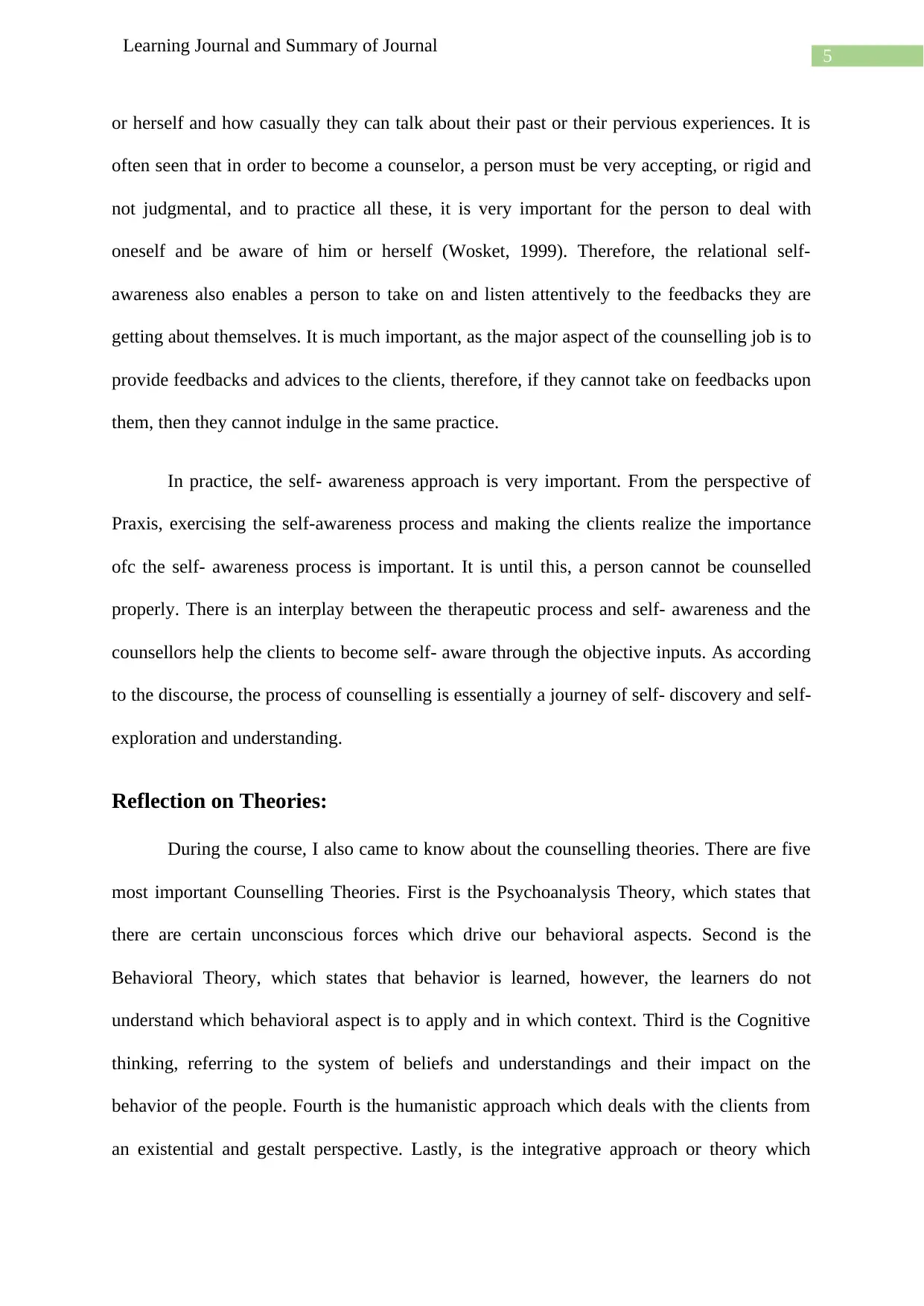
5
Learning Journal and Summary of Journal
or herself and how casually they can talk about their past or their pervious experiences. It is
often seen that in order to become a counselor, a person must be very accepting, or rigid and
not judgmental, and to practice all these, it is very important for the person to deal with
oneself and be aware of him or herself (Wosket, 1999). Therefore, the relational self-
awareness also enables a person to take on and listen attentively to the feedbacks they are
getting about themselves. It is much important, as the major aspect of the counselling job is to
provide feedbacks and advices to the clients, therefore, if they cannot take on feedbacks upon
them, then they cannot indulge in the same practice.
In practice, the self- awareness approach is very important. From the perspective of
Praxis, exercising the self-awareness process and making the clients realize the importance
ofc the self- awareness process is important. It is until this, a person cannot be counselled
properly. There is an interplay between the therapeutic process and self- awareness and the
counsellors help the clients to become self- aware through the objective inputs. As according
to the discourse, the process of counselling is essentially a journey of self- discovery and self-
exploration and understanding.
Reflection on Theories:
During the course, I also came to know about the counselling theories. There are five
most important Counselling Theories. First is the Psychoanalysis Theory, which states that
there are certain unconscious forces which drive our behavioral aspects. Second is the
Behavioral Theory, which states that behavior is learned, however, the learners do not
understand which behavioral aspect is to apply and in which context. Third is the Cognitive
thinking, referring to the system of beliefs and understandings and their impact on the
behavior of the people. Fourth is the humanistic approach which deals with the clients from
an existential and gestalt perspective. Lastly, is the integrative approach or theory which
Learning Journal and Summary of Journal
or herself and how casually they can talk about their past or their pervious experiences. It is
often seen that in order to become a counselor, a person must be very accepting, or rigid and
not judgmental, and to practice all these, it is very important for the person to deal with
oneself and be aware of him or herself (Wosket, 1999). Therefore, the relational self-
awareness also enables a person to take on and listen attentively to the feedbacks they are
getting about themselves. It is much important, as the major aspect of the counselling job is to
provide feedbacks and advices to the clients, therefore, if they cannot take on feedbacks upon
them, then they cannot indulge in the same practice.
In practice, the self- awareness approach is very important. From the perspective of
Praxis, exercising the self-awareness process and making the clients realize the importance
ofc the self- awareness process is important. It is until this, a person cannot be counselled
properly. There is an interplay between the therapeutic process and self- awareness and the
counsellors help the clients to become self- aware through the objective inputs. As according
to the discourse, the process of counselling is essentially a journey of self- discovery and self-
exploration and understanding.
Reflection on Theories:
During the course, I also came to know about the counselling theories. There are five
most important Counselling Theories. First is the Psychoanalysis Theory, which states that
there are certain unconscious forces which drive our behavioral aspects. Second is the
Behavioral Theory, which states that behavior is learned, however, the learners do not
understand which behavioral aspect is to apply and in which context. Third is the Cognitive
thinking, referring to the system of beliefs and understandings and their impact on the
behavior of the people. Fourth is the humanistic approach which deals with the clients from
an existential and gestalt perspective. Lastly, is the integrative approach or theory which
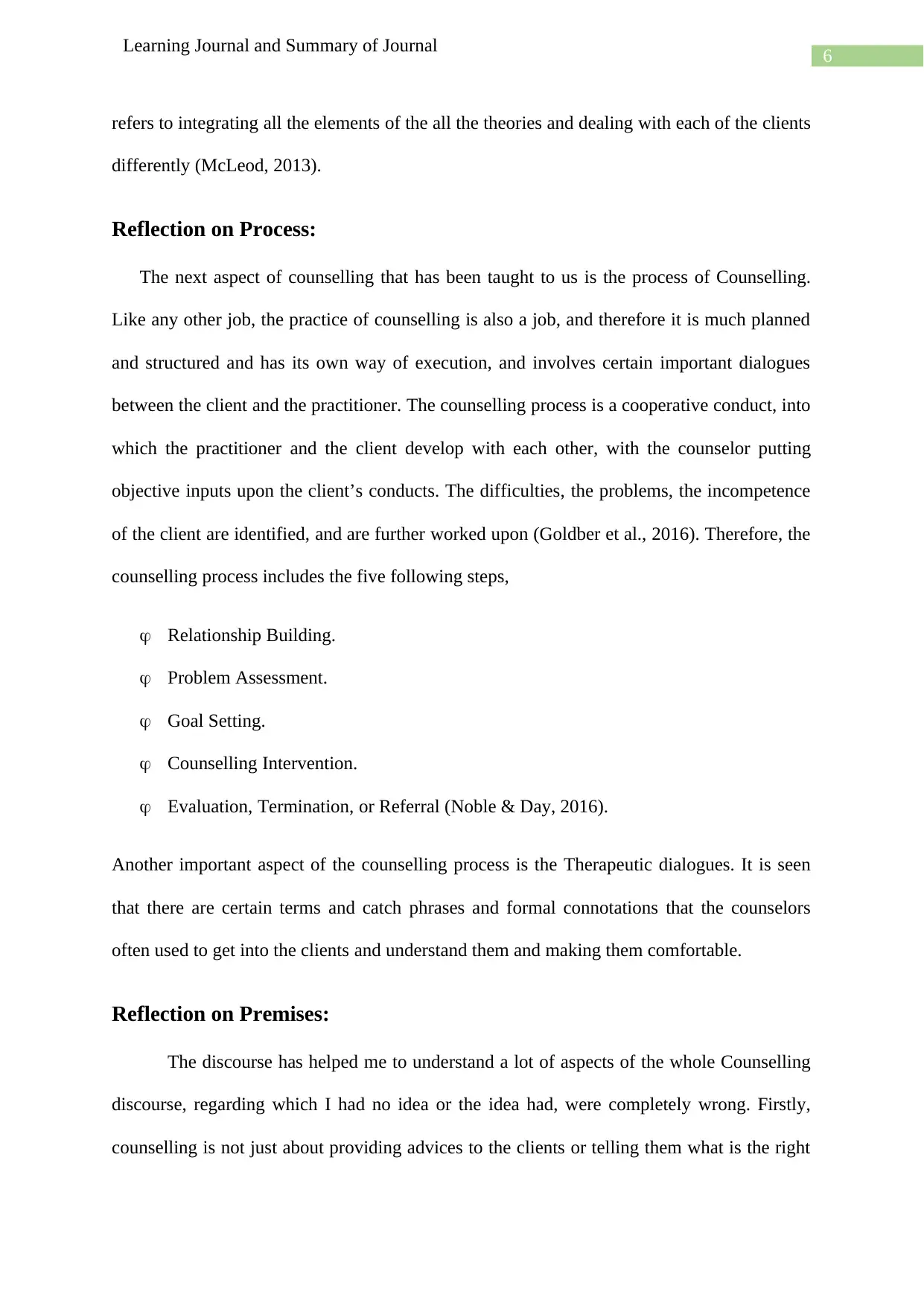
6
Learning Journal and Summary of Journal
refers to integrating all the elements of the all the theories and dealing with each of the clients
differently (McLeod, 2013).
Reflection on Process:
The next aspect of counselling that has been taught to us is the process of Counselling.
Like any other job, the practice of counselling is also a job, and therefore it is much planned
and structured and has its own way of execution, and involves certain important dialogues
between the client and the practitioner. The counselling process is a cooperative conduct, into
which the practitioner and the client develop with each other, with the counselor putting
objective inputs upon the client’s conducts. The difficulties, the problems, the incompetence
of the client are identified, and are further worked upon (Goldber et al., 2016). Therefore, the
counselling process includes the five following steps,
Relationship Building.
Problem Assessment.
Goal Setting.
Counselling Intervention.
Evaluation, Termination, or Referral (Noble & Day, 2016).
Another important aspect of the counselling process is the Therapeutic dialogues. It is seen
that there are certain terms and catch phrases and formal connotations that the counselors
often used to get into the clients and understand them and making them comfortable.
Reflection on Premises:
The discourse has helped me to understand a lot of aspects of the whole Counselling
discourse, regarding which I had no idea or the idea had, were completely wrong. Firstly,
counselling is not just about providing advices to the clients or telling them what is the right
Learning Journal and Summary of Journal
refers to integrating all the elements of the all the theories and dealing with each of the clients
differently (McLeod, 2013).
Reflection on Process:
The next aspect of counselling that has been taught to us is the process of Counselling.
Like any other job, the practice of counselling is also a job, and therefore it is much planned
and structured and has its own way of execution, and involves certain important dialogues
between the client and the practitioner. The counselling process is a cooperative conduct, into
which the practitioner and the client develop with each other, with the counselor putting
objective inputs upon the client’s conducts. The difficulties, the problems, the incompetence
of the client are identified, and are further worked upon (Goldber et al., 2016). Therefore, the
counselling process includes the five following steps,
Relationship Building.
Problem Assessment.
Goal Setting.
Counselling Intervention.
Evaluation, Termination, or Referral (Noble & Day, 2016).
Another important aspect of the counselling process is the Therapeutic dialogues. It is seen
that there are certain terms and catch phrases and formal connotations that the counselors
often used to get into the clients and understand them and making them comfortable.
Reflection on Premises:
The discourse has helped me to understand a lot of aspects of the whole Counselling
discourse, regarding which I had no idea or the idea had, were completely wrong. Firstly,
counselling is not just about providing advices to the clients or telling them what is the right
Paraphrase This Document
Need a fresh take? Get an instant paraphrase of this document with our AI Paraphraser
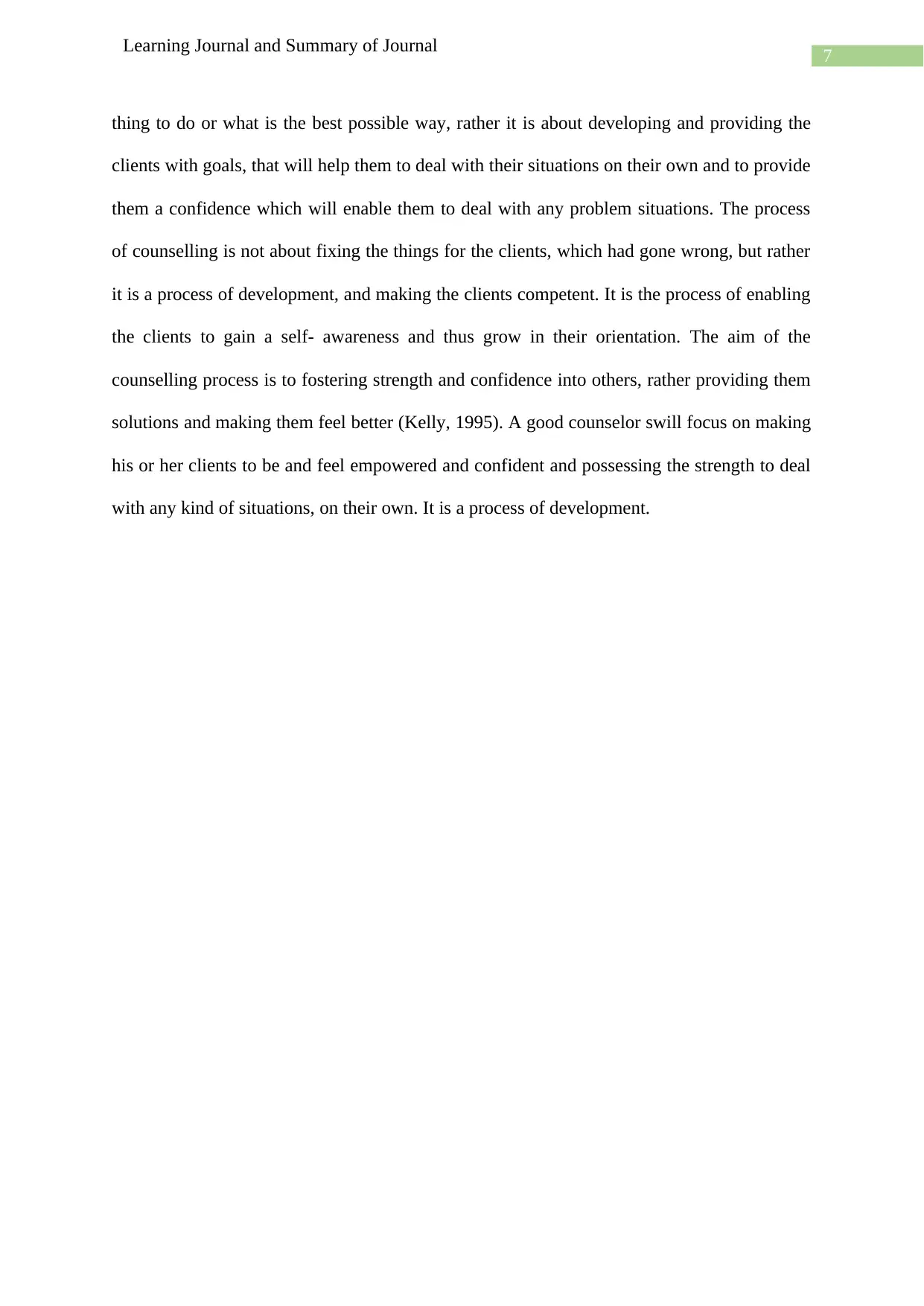
7
Learning Journal and Summary of Journal
thing to do or what is the best possible way, rather it is about developing and providing the
clients with goals, that will help them to deal with their situations on their own and to provide
them a confidence which will enable them to deal with any problem situations. The process
of counselling is not about fixing the things for the clients, which had gone wrong, but rather
it is a process of development, and making the clients competent. It is the process of enabling
the clients to gain a self- awareness and thus grow in their orientation. The aim of the
counselling process is to fostering strength and confidence into others, rather providing them
solutions and making them feel better (Kelly, 1995). A good counselor swill focus on making
his or her clients to be and feel empowered and confident and possessing the strength to deal
with any kind of situations, on their own. It is a process of development.
Learning Journal and Summary of Journal
thing to do or what is the best possible way, rather it is about developing and providing the
clients with goals, that will help them to deal with their situations on their own and to provide
them a confidence which will enable them to deal with any problem situations. The process
of counselling is not about fixing the things for the clients, which had gone wrong, but rather
it is a process of development, and making the clients competent. It is the process of enabling
the clients to gain a self- awareness and thus grow in their orientation. The aim of the
counselling process is to fostering strength and confidence into others, rather providing them
solutions and making them feel better (Kelly, 1995). A good counselor swill focus on making
his or her clients to be and feel empowered and confident and possessing the strength to deal
with any kind of situations, on their own. It is a process of development.
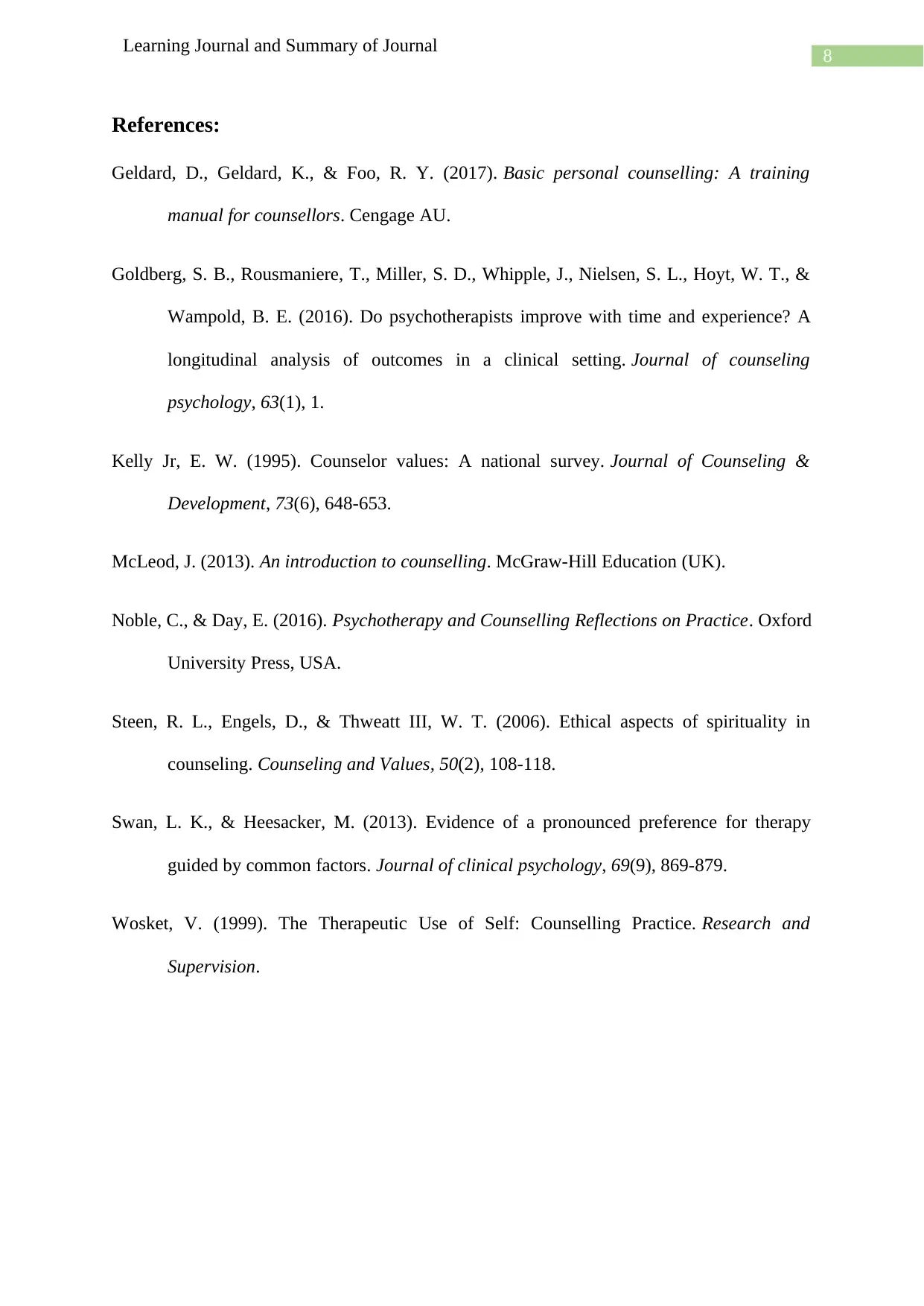
8
Learning Journal and Summary of Journal
References:
Geldard, D., Geldard, K., & Foo, R. Y. (2017). Basic personal counselling: A training
manual for counsellors. Cengage AU.
Goldberg, S. B., Rousmaniere, T., Miller, S. D., Whipple, J., Nielsen, S. L., Hoyt, W. T., &
Wampold, B. E. (2016). Do psychotherapists improve with time and experience? A
longitudinal analysis of outcomes in a clinical setting. Journal of counseling
psychology, 63(1), 1.
Kelly Jr, E. W. (1995). Counselor values: A national survey. Journal of Counseling &
Development, 73(6), 648-653.
McLeod, J. (2013). An introduction to counselling. McGraw-Hill Education (UK).
Noble, C., & Day, E. (2016). Psychotherapy and Counselling Reflections on Practice. Oxford
University Press, USA.
Steen, R. L., Engels, D., & Thweatt III, W. T. (2006). Ethical aspects of spirituality in
counseling. Counseling and Values, 50(2), 108-118.
Swan, L. K., & Heesacker, M. (2013). Evidence of a pronounced preference for therapy
guided by common factors. Journal of clinical psychology, 69(9), 869-879.
Wosket, V. (1999). The Therapeutic Use of Self: Counselling Practice. Research and
Supervision.
Learning Journal and Summary of Journal
References:
Geldard, D., Geldard, K., & Foo, R. Y. (2017). Basic personal counselling: A training
manual for counsellors. Cengage AU.
Goldberg, S. B., Rousmaniere, T., Miller, S. D., Whipple, J., Nielsen, S. L., Hoyt, W. T., &
Wampold, B. E. (2016). Do psychotherapists improve with time and experience? A
longitudinal analysis of outcomes in a clinical setting. Journal of counseling
psychology, 63(1), 1.
Kelly Jr, E. W. (1995). Counselor values: A national survey. Journal of Counseling &
Development, 73(6), 648-653.
McLeod, J. (2013). An introduction to counselling. McGraw-Hill Education (UK).
Noble, C., & Day, E. (2016). Psychotherapy and Counselling Reflections on Practice. Oxford
University Press, USA.
Steen, R. L., Engels, D., & Thweatt III, W. T. (2006). Ethical aspects of spirituality in
counseling. Counseling and Values, 50(2), 108-118.
Swan, L. K., & Heesacker, M. (2013). Evidence of a pronounced preference for therapy
guided by common factors. Journal of clinical psychology, 69(9), 869-879.
Wosket, V. (1999). The Therapeutic Use of Self: Counselling Practice. Research and
Supervision.
1 out of 9
Related Documents
Your All-in-One AI-Powered Toolkit for Academic Success.
+13062052269
info@desklib.com
Available 24*7 on WhatsApp / Email
![[object Object]](/_next/static/media/star-bottom.7253800d.svg)
Unlock your academic potential
© 2024 | Zucol Services PVT LTD | All rights reserved.




